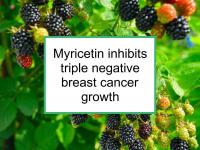Myricetin is a flavonol found in a variety of berries and other plant-based foods. It has been shown to trigger apoptosis (programmed cell death) in hormone receptor positive (ER+/PR+) breast cancer cells. In addition, myricetin has been shown to interfere with tumor cell immortality by preventing telomere extension.
Myricetin has also been shown to increase the oral bioavailability of docetaxel in rats and to enhance the cytotoxic treatment effects of paclitaxel in ovarian cancer cells. Now a new study has reported that myricetin inhibits triple negative (ER-/PR-/HER2-) breast cancer cell migration, invasion, and adhesion and also reduces tumor growth and metastasis in a mouse model of triple negative breast cancer.
Latest research finds myricetin prevents TN tumor growth
The study referenced above was designed to investigate the effects of myricetin in triple negative breast cancer cells and in a mouse model of breast cancer using the same cell line. The authors used highly aggressive MDA‐Mb‐231Br triple negative breast cancer cells, which have a tendency to metastasize to brain. Myricetin significantly reduced important markers of tumor growth and metastasis. In fact, myricetin was found to inhibit the migration, invasion, and adhesion of MDA‐Mb‐231Br cells in a dose‐dependent manner.
In addition, mice implanted with MDA‐Mb‐231Br cells and administered myricetin (50 mg/kg) developed smaller tumors and fewer lung metastases than mice who did not receive myricetin. The authors conclude that myricetin can significantly block the invasion of MDA‐Mb‐231Br triple negative cells, as well as lung metastasis in a mouse model, suggesting that myricetin has the potential to be successfully developed as a treatment for breast cancer.
Please see our article on triple negative diet for more information.
